Problem “Błąd zbyt wielu przekierowań” to błąd WordPress a, który może być spowodowany przez wtyczkę lub nieprawidłowe ustawienia. W rzeczywistości jest to jeden z najczęstszych błędów obserwowanych przez naszych czytelników i innych użytkowników WordPressa.
Ten błąd może nawet zablokować twoją witrynę internetową, co czyni go nieco trudnym do poprawienia. Na szczęście wielokrotnie rozwiązywaliśmy problem zbyt wielu przekierowań, więc dokładnie wiemy, co robić.
W tym artykule pokażemy, jak łatwo poprawić problem “Błąd zbyt wielu przekierowań” w WordPress. Omówimy również, jak odzyskać dostęp do twojej witryny internetowej i rozwiązać błąd.

Porada eksperta: Wolisz zostawić rozwiązywanie problemów profesjonalistom? Nasze usługi pomocy technicznej WordPress mogą błyskawicznie poprawić twój błąd i przywrócić witrynę do działania. Ponadto oferujemy jednorazowe poprawki, więc nie musisz martwić się o stałe umowy.
Co powoduje problem “zbyt wielu przekierowań” w WordPressie?
“Błąd zbyt wielu przekierowań” jest spowodowany błędnie skonfigurowanym problemem przekierowania w WordPress.
Jak być może już wiesz, WordPress posiada przyjazną dla SEO funkcję struktury adresów URL, która wykorzystuje funkcję przekierowania. Podobnie, wiele popularnych wtyczek WordPress wykorzystuje tę funkcję do ustawiania tymczasowych przekierowań, tworzenia trwałych przekierowań 301 i poprawek błędów 404.
Jeśli używasz wtyczki do poprawki niezabezpieczonej treści SSL lub wtyczki do pamięci podręcznej WordPress, może to również mieć wpływ na przekierowania i powodować błąd “zbyt wielu przekierowań”.
Tak wygląda komunikat “ERR_TOO_MANY_REDIRECTS” w przeglądarce Google Chrome.
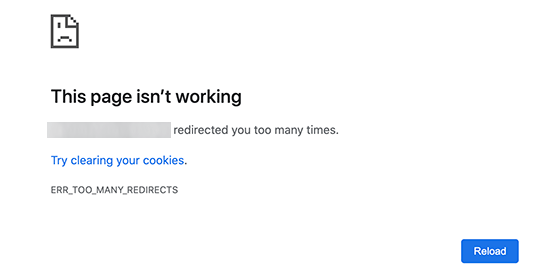
Ten błąd nie informuje jednak, co powoduje konflikt i wymusza pętlę przekierowań w WordPress.
Tak wygląda błąd w przeglądarce Firefox z komunikatem “Strona nie przekierowuje prawidłowo”.
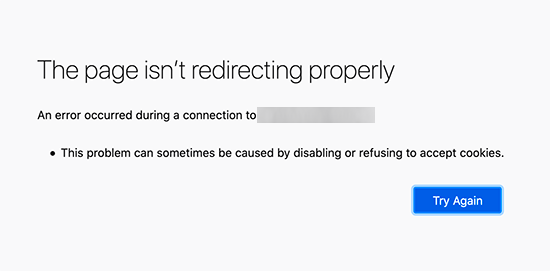
W związku z tym przyjrzyjmy się, jak poprawić błąd zbyt wielu przekierowań w WordPress.
Przeprowadzimy Cię krok po kroku przez rozwiązywanie problemów, uzyskiwanie dostępu do Twojej witryny WordPress i zapobieganie ponownemu wystąpieniu błędu.
1. Wyczyść pliki ciasteczka i pamięć podręczna przeglądarki
Częstą przyczyną błędu mogą być pliki ciasteczka twojej przeglądarki internetowej. Spróbuj uzyskać dostęp do twojej witryny internetowej za pomocą innej przeglądarki internetowej, takiej jak Firefox, Safari, Opera lub Microsoft Edge.
Jeśli jesteś w stanie uzyskać normalny dostęp do witryny internetowej za pomocą innej przeglądarki, musisz wyczyścić pliki ciasteczka i pamięć podręczna przeglądarki w swojej zwykłej przeglądarce.
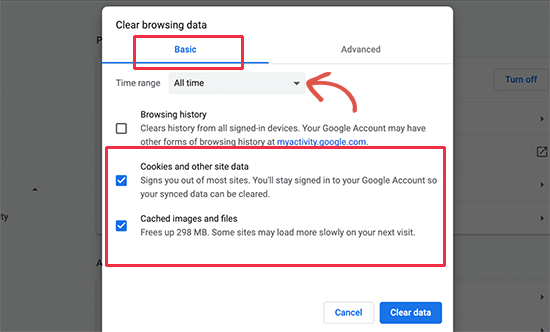
Mamy szczegółowy przewodnik na temat czyszczenia pamięci podręcznej przeglądarki we wszystkich głównych przeglądarkach, który pomoże ci to zrobić.
Z drugiej strony, jeśli zmiana przeglądarki nie rozwiąże problemu, możesz przejść do następnego kroku.
2. Wyłączanie wszystkich wtyczek WordPress.
Najczęstszą przyczyną pętli przekierowań WordPress lub “ERR_TOO_MANY_REDIRECTS” jest konflikt wtyczek. Wtyczka WordPress próbująca skonfigurować przekierowanie w sposób kolidujący z domyślnymi przekierowaniami WordPress może powodować ten komunikat o błędzie.
Aby to poprawić, musisz wyłączyć wszystkie wtyczki WordPress na twojej witrynie internetowej. Zwykle wystarczy przejść do strony Wtyczki ” Wszystkie wtyczki w obszarze administracyjnym WordPress i stamtąd wyłączać wtyczki.
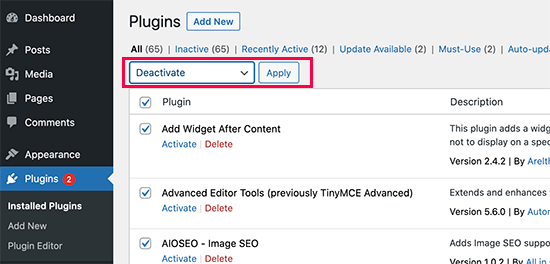
Zakładamy jednak, że z powodu błędu przekierowania możesz nie mieć dostępu do obszaru administracyjnego WordPress.
W takim przypadku konieczne będzie wyłączanie wtyczek WordPress za pomocą klienta FTP, takiego jak FileZilla lub aplikacji Menedżer plików w panelu sterowania twojego hostingu WordPress.
Wystarczy połączyć się z twoją witryną internetową za pomocą klienta FTP i przejść do katalogu /wp-content/.
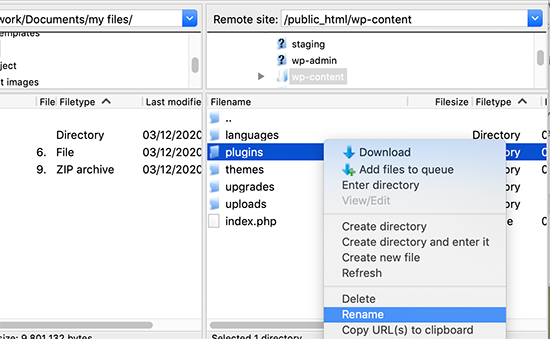
Znajdziesz tam katalog wtyczek, którego nazwę musisz zmienić na “plugins.wyłączanie”.
Spowoduje to wyłączanie wszystkich wtyczek WordPress na twojej witrynie.
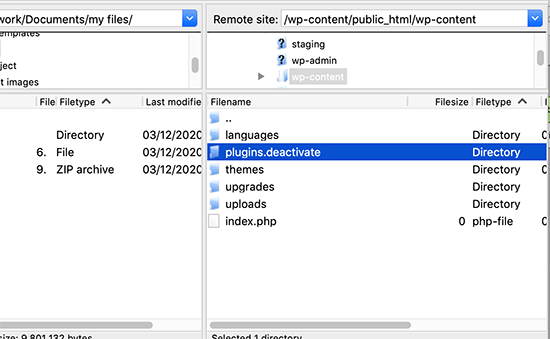
Zasadniczo WordPress szuka katalogu o nazwie wtyczki, aby wczytywać pliki wtyczek. Gdy nie znajdzie katalogu, automatycznie wyłącza włączone wtyczki w bazie danych.
Teraz możesz spróbować przejść na twoją witrynę internetową WordPress. Jeśli jesteś w stanie logować się do twojego obszaru administracyjnego WordPress, oznacza to, że jedna z wtyczek powodowała błąd.
Aby dowiedzieć się, która wtyczka była winowajcą, musisz przełączyć się z powrotem do klienta FTP lub aplikacji File Manager i zmienić nazwę twojego katalogu plugins.deactivate z powrotem na “plugins”.
Następnie przejdź do obszaru administracyjnego WordPress twojej witryny internetowej i przejdź do strony Wtyczki ” Wszystkie wtyczki. Z tego miejsca możesz włączać swoje wtyczki jedna po drugiej, a następnie przejdź na swoją witrynę internetową, aby sprawdzić, czy możesz odtworzyć błąd.
Po znalezieniu wtyczki, która powoduje błąd, można znaleźć alternatywę dla tej wtyczki lub zgłosić problem na forum wsparcia WordPress dla wtyczki.
3. Poprawka adresów URL WordPressa
Inną główną przyczyną tego błędu jest błędna konfiguracja w ustawieniach adresu URL WordPress. Zazwyczaj opcje te można zobaczyć na stronie Ustawienia ” Ogólne.
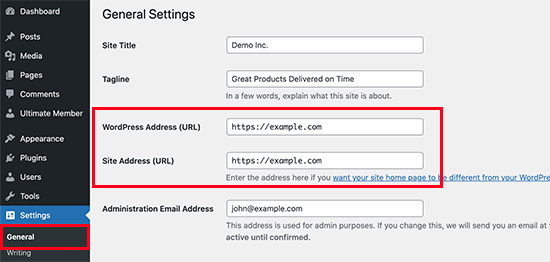
W przypadku większości witryn internetowych adresy URL w polach “Adres WordPress” i “Adres witryny” muszą być takie same. Jednak niektórzy użytkownicy mogą używać “www” w jednym adresie URL i adresu URL innego niż www w drugim.
Ponieważ możesz nie mieć dostępu do obszaru administracyjnego WordPress, może być konieczne poprawienie adresów URL WordPress za pomocą klienta FTP lub aplikacji File Manager.
Wystarczy połączyć się z witryną WordPress za pomocą klienta FTP i przejść do katalogu /wp-content/themes/your-theme-folder/.

Następnie należy znaleźć plik functions.php i edytować go za pomocą zwykłego edytora tekstu, takiego jak Notatnik lub TextEdit.
Następnie należy dodać następujący kod na dole:
1 2 | update_option( 'siteurl', 'https://example.com' );update_option( 'home', 'https://example.com' ); |
Nie zapomnij zastąpić “https://example.com” adresami URL twojej witryny. Możesz teraz zapisać zmiany i przesłać plik z powrotem do twojej witryny internetowej.
Następnie spróbuj przejść na twoją witrynę internetową, aby sprawdzić, czy to rozwiąże błąd.
Więcej metod można znaleźć w naszym poradniku na temat łatwej zmiany adresów URL WordPress.
4. Zresetuj plik .htaccess WordPressa
Plik .htaccess to specjalny plik używany przez serwer witryny internetowej do zarządzania przekierowaniami i innymi ustawieniami serwera. WordPress używa tego pliku również do przyjaznych dla SEO adresów URL i innych przekierowań.
Czasami wtyczki WordPress mogą wprowadzać zmiany w pliku .htaccess twojej witryny internetowej, co może powodować ten błąd. Możliwe jest również, że wyłączanie wtyczki nie usuwa tych zmian z twojego pliku .htaccess.
W takim przypadku będziesz musiał ręcznie zresetować twój plik WordPress .htaccess.
Ponownie, będziesz musiał uzyskać dostęp do twojej witryny internetowej za pomocą klienta FTP lub aplikacji File Manager w kokpicie hostingu. Po połączeniu zobaczysz plik .htaccess w katalogu głównym twojej witryny internetowej.
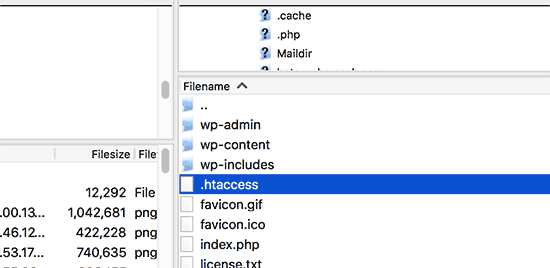
Uwaga: Jeśli nie możesz znaleźć twojego pliku .htaccess, zapoznaj się z naszym przewodnikiem, jak znaleźć plik .htaccess w WordPress.
Najpierw należy pobrać kopię twojego pliku .htaccess na komputer jako kopię zapasową. Następnie możesz usunąć plik z twojej witryny internetowej.
Możesz teraz spróbować przejść na twój blog WordPress. Jeśli wszystko działa normalnie, oznacza to, że twój plik .htaccess powodował błąd przekierowania.
Teraz, ponieważ usunęliśmy plik .htaccess, będziesz musiał go odtworzyć. Zwykle twoja witryna internetowa WordPress może to zrobić samodzielnie. Aby się upewnić, wystarczy przejść do strony Ustawienia ” Bezpośrednie odnośniki i kliknąć przycisk “Zapisz zmiany” u dołu.
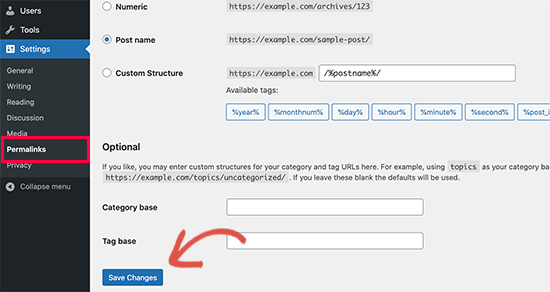
5. Zapobieganie błędom zbyt wielu przekierowań w WordPress
Miejmy nadzieję, że kroki, które właśnie omówiliśmy, naprawiły problem z przekierowaniem na twojej witrynie internetowej. Jeśli nie poprawiły one problemu, być może będziesz musiał porozmawiać ze swoją firmą hostingową WordPress, aby upewnić się, że nie ma problemu z serwerem.
Gdy poprawią problem na twojej witrynie, powinieneś być w stanie dowiedzieć się, co go spowodowało.
Jeśli była to wtyczka, należy zgłosić problem na forum wsparcia technicznego wtyczki. Zobacz nasz przewodnik, jak poprosić o pomoc techniczną WordPress. Jeśli jednak nie jesteś w stanie uzyskać pomocy, zawsze możesz znaleźć alternatywną wtyczkę, która robi to samo.
Jeśli błąd był spowodowany błędną konfiguracją witryny WordPress, możesz to zanotować i upewnić się, że ustawienia twojej witryny są poprawnie skonfigurowane.
Aby uzyskać więcej wskazówek, zapoznaj się z naszym szczegółowym poradnikiem na temat samodzielnego rozwią zywania problemów z WordPressem.
Film instruktażowy
Jeśli nie lubisz pisemnych instrukcji, możesz skorzystać z naszego poradnika w formie filmu:
Mamy nadzieję, że ten artykuł pomógł ci rozwiązać problem “błędu zbyt wielu przekierowań” na twojej witrynie internetowej. Możesz również dodać do zakładek nasz ostateczny podręcznik typowych błędów WordPress i zobaczyć, jak skontaktować się z pomocą techniczną WordPress.
If you liked this article, then please subscribe to our YouTube Channel for WordPress video tutorials. You can also find us on Twitter and Facebook.





David Najman
Hi,
I had this error on the product tag page. I tried all the possible repairs mantioned above with no luck.
Finally, I had to rename slug for tags not to be numbers, eg. 2016, so I renamed it to r2016 and it started to work!
It must have been caused by some wordpress update, because it have been working few years before with tags named as numbers.
WPBeginner Support
Thanks for sharing what worked for you, if your product page is created by a plugin you may want to try reaching out to the plugin’s support to let them know about that issue
Admin
Yavan Kumar
Hi,
My whole website is running properly, but the homepage is redirected too many times and same issue with the wp-admin page too. I tried all the methods you mentioned but nothing worked for me.
Please advice me if there is any another solution for that.
Thanks in advance…
WPBeginner Support
If none of the methods from the article worked, you would want to reach out to your hosting provider for them to see if there are any issues they can see on their end.
Admin
John Zoetebier
My web site is a Bitnami WordPress deployment on Google Cloud Platform.
When I use:
define(‘WP_SITEURL’, ‘http:/example.cloud’);
the home page gets redirected to itself and browsers error message.
I now use the original Bitnami setting and it works great !
define(‘WP_SITEURL’, ‘http://’ . $_SERVER[‘HTTP_HOST’] . ‘/’);
WPBeginner Support
You are missing a slash next to your http in the first define statement but thank you for sharing your workaround.
Admin
Chad
I had to desactivate a plugin and it worked back fine. I identified the plugin to desactivate by looking into my URL where I was getting a redirect error. The plugin name was written there.
WPBeginner Support
Thanks for sharing how you found the error for others trying to solve this problem
Admin
Nirav Patel
Thanks you bro for information of wp error
WPBeginner Support
Glad our article could help
Admin
irga
yeah, you know,,, i searching for it,,,,, and then mys wordpress site working again, thanksfull
Rahul
Thans buddy , really helps
Josh
I’ve tried all the steps here with no luck today. Luckily my website is functioning ok but I can’t log into the wp-admin dashboard for anything.
What are the other options? There must be other ways I can figure out what’s causing it?
Deby
I’m having the same. My site works fine for visitors, but I only get the redirect error for the backend, my WP dashboard.
It’s a new site and I don’t even have any plugins installed yet. I’m stumped.
Bryant Thomas
Holy Cow That worked, I’ve done many websites migrations and never ran into this issue. Thank you the define(‘WP_HOME’,’http://example.com’);
define(‘WP_SITEURL’,’http://example.com’); worked with the www.
Rutvi Trivedi
Hi, My problem is when I go to my site’s dashboard(/wp-admin) it is giving me this error I tried this solution and unfortunately it is not working. Please help me to solve this error.
Shakeane
I just want to say thank you so much for sharing this knowledge, you wouldn’t understand how much this has helped me, something as minor is adding www or leaving the forward slash at the end has caused so many headaches, thank you so much.
Marc
Awesome! Only took 5 minutes and fixed!!!
hassan
dear sir,
i have huge data on my website i change my address directly from http://www.example.com to example.com i remove www from wp-confiq and phpmyadmin without doing the above procedure, now i update all the plugin and theme everything is fine but my theme setting is not editing when i am going to change setting of my theme the changes reverting …please help how to solve this problem i will be thankful to you
i am trying to solve this problem from three days but fail
please help
Sachin
Hi, my website is running without any error but i have this issue in backend when i open appearance>customize tab. I am unable to customize my website from backend. How can i solve it?
Adrian Daniels
Wow, this actually worked, thanks!!
Toheeb
Hi!
Thank you for your post…
I was able to solve mine changing the WP_SITEURL and WP_HOME to lowercase letters. I capitalized each word formerly for readability and as it turned out, it redirects post paginated pages.
Everything seems fine now. Thank You
Laurena
Hey, this was my problem! Thanks for your comment here.
scott
This was my problem as well.
Karla
This was my problem too! Thanks for your comment! I tried everything in the video but nothing worked.
Rudy Reteig
I made a redirect in ADDOn Domain to rid my site of a tail, “/blog”, behind my URL, appeared when launched the site. This was in my opinion automatically done, as I have two sites on the same PUBLIC_html directory. probably to avoid conflict of files with the same name of the two sites
Robin
None of these fixes worked for me. In the end it turns out I had setup a custom page rule in CloudFlare a long time ago to treat the wordpress dashboard different to the rest of the site. It had “SSL – Flexible” set which causes the error. I just set the rule to “Full” and it works fine again.
Ada
This was the fix for me. Thank you so much!
Damien
Oh God! Thank you so much
Daniel
Thanks a lot for this fix, after like 5 hours on this error, finally solved the issue. I spend more time on fixing errors than building website with wordpress. I’m tired
Simon
Thanks bro. Hours of checking .htaccess etc and its just a simple cloudflare problem.
Rares
This was the solution for me too. Thank you so much for sharing!
Jack
This fixed mine! Thanks!
Jeenie
Same here – once “Flexible” was changed to “Full” in the Cloudflare SSL settings, it worked! Phew. (Wish I saw your comment sooner!)
Nancy
Thank you soooooo much for this! It worked.
Florian
I also had the problem, so I started searching for a solution and found out that the CDN was causing that error. I switched it off and it worked again
Jennifer
Thank God I saw your reply. I thought because I had added the Yoast SEO plugin, it was causing the issues, but I had also activated CDN in my control panel and that was the problem!
Alex Jr
I deactivated all plugins, disabled the current theme, deleted .htaccess, but I’m still getting the “too many redirects” error when I try to access my wordpress site. What is causing it and how can I fix it?
Dan
Just had this happen to me on a new site I’m working on. The issue turned out that I created my child theme with spaces in the name. As soon as I renamed the child theme folder to my-child-theme it worked. I did have to go and make my child theme active again to make it work right. Hope this saves someone so grief and aggravation!
ANA
Dan, I just wanted to say THANK YOU!!!!!!!
That was my problem too, apparently. I changed the name and folder to include a dash and everything works fine.
Santiago
I’m finding that when I try to set my Permalink to Post Name I get the redirect issue. When I set it to Plain, no issues. I’ve disabled all the plugins and still the same thing.
I’m new to WP but 20+ years IT, any help would be greatly appreciated.
Damion
+1 on this and thank for for so thoroughly and generously sharing your knowledge – you saved me hours of work today.
Bilal Asghar
This is a really helpful article. I had the redirection issues with my WordPress website. I just changed my Post URLS going to Setting>Permalinks.
Ebad Ur Rehman
My site is redirected too many time in the preview of customization
other functions of theme are working fine.
please tell the solution for the problem
Sharon Booker
Thank you so much. I called my hosting service help desk twice and nothing they told me to do helped. This fixed the error.
Amit Khandelwal
I’m getting “ERR_TOO_MANY_REDIRECTS” problem only on website Home page but other pages working fine. I think plugin “Redirection” create this problem but it’s my need to keep activate this.
Please suggest.
Tenzin Nima
Thank you so much!! I have been looking for solution for whole day and finally solved it.
Thank you
maria
ive tried the first option, Settings » General and changed the url. the thing is, i accidentally put a ; instead of a . on the adress.
Now the site is all messed up and i cant even login on the admin user anymore, to change it back :/ any tips?
WPBeginner Support
Hi Maria,
You can fix this by adding this code to your WordPress site’s wp-config.php file.
define('WP_HOME','http://example.com');define('WP_SITEURL','http://example.com');1-click Use in WordPress
Don’t forget to replace example.com with your own domain name.
Admin
Yildirim
hi,
what about https
WPBeginner Support
The code is example code, if you are using https then you would put https in the code
Em Walker
Hi, Every time I go to the WIDGET page to load my adsense ads then my page freezes up and becomes unresponsive, how can I fix this, please
Mark
Thank you that worked
Abiskar Bharati
I tried all the things mentioned in the blog but issue still persisted so I did what Jake Philips(one of the comment above) did and I found that something had changed the permalink structure setting to:
/’/%year%/%monthnum%/%day%/%postname%/’
I changed it back to (as the comment suggests) :
/%year%/%monthnum%/%day%/%postname%/
and then everything was working fine again…
Abhishekh Maharjan
Thank You. It worked
Cindy
When I put my link on Facebook my photo that’s on my webpage does not come up just my website name and URL. Any idea what I need to do to have a thumbnail photo?
Felix
Hi, CINDY.
That’s because you didn’t use Yoast plugin, and didn’t set the rules on Facebook tab. The issue is related to open graph protocol.
Khori Carnes
Hi. I am having a some what odd issue, i feel. My redirect issue is that when i attempt to access my wordpress admin page using my domain, it redirects me to godaddy.com. my only explanation I can come up with is that i purchased my domain name from godaddy. However i purchased my web hosting from hostgator. Regardless, i can not access my admin page for wordpress to begin establishing my new website.
Any and all help or suggestions would be greatly appreciated! Thanks
WPBeginner Support
Hi Khori,
You can contact GoDaddy support and they can help you point out your domain name to your hosting provider. All you need to do is go to your GoDaddy account and point Name Server settings for your domain name to HostGator.
Admin
Ralf
In my case the problem was special characters in the URL. You can’t have those with wordpress. E.g. German umlauts: ÄÖÜ – need to be converted.
Teemu
Yes and no. I succesfully ran a website with “ä” character in there for a few years. But this time this might be the reason why I’m searching help to this problem here with a website that now has the same “ä” character there also…
Don Stewart
I panicked when I could not access my website home screen (though I could the other pages). I messed around with the Settings=>General URL settings, and I saw that the same address appeared as the WordPress URL and the website URL—which meant it was going around in circles, as you pointed out. I fiddled with that for awhile, almost locking myself out of WordPress altogether, but then deactivated several recently installed plugins. Fixed! I’m not sure which plugin caused it—I will investigate that, by omitting the one I think is most likely and one-by-one reactivating the others, but my suggestion is to follow your article from the bottom up. Check out those recent plugins!
Jake Phillips
I had just enabled CDN and SSL in Bluehost for my WordPress site when this started happening. I found that something had changed the permalink structure setting to:
/’/%year%/%monthnum%/%day%/%postname%/’
I changed it back to:
/%year%/%monthnum%/%day%/%postname%/
and then everything was working fine again…
Asma
Hi,
Your article is really good and may be a solution of my recent problem. But I am not a WordPress expert and not enough brave to experiment with my site, though the blog is completely built by myself.
However, I’m seeing the following things from last two days–
“This page isn’t working
m redirected you too many times.
Try clearing your cookies.
ERR_TOO_MANY_REDIRECTS”
I’ve tried many times after clearing cookies, still, I can’t log into my site.
Can you please give a solution?
WPBeginner Support
Hi Asma,
If you have tried steps mentioned above, then you can try our WordPress troubleshooting guide. It will help you figure out what’s causing the issue and how to fix it.
Admin
Adeshola
My problem seemed to be a mixture of plugins and wp-config.php. After deactivating my plugins, I was able to access my site but not my wp-admin area. I fixed this by updating my wp-config with the codes provided above. However, they worked only after I put them before the “/* That’s all, stop editing! Happy blogging. */” line. This was something you guys didn’t include in your tutorial but I found somewhere else. So thanks for everything. My site works now.
George
Just wanted to say this article helped me a great deal… Here’s my case:
WP installed in a directory: domain.com/widget
domain.com .htaccess edited for SEO purposes to say
DirectoryIndex /widget/index.php /widget/
This caused the “too many redirects” issue. Possibly because of the trailing slash in the domain.com .htaccess file??
Anyway, this fixed it:
domain.com .htaccess edited to:
DirectoryIndex /widget
Now it works.
Huzzay for cPanel!!!
Mirjam
My issue is that trying to access the login page keeps giving me a redirect to https:// but my site is in http://. Have tried everything, adding home url to config.php, disabling plugins, renewing .htaccess. There is no redirect defined in CPanel so I’m lost as to why this is happening. The site is available, but I cannot access admin.
Getting a bit hopeless here…
WPBeginner Support
Please contact your WordPress hosting provider, they may be able to help you out.
Admin
Gilbert Stawny
If none of the above works, rename your .htaccess file to htaccess.old or something. Try to log in again.
Talha Wahid
Thanks a lot, Finally i solve it by spending whole week. only adding to the wp-config.com
define(‘WP_HOME’,’http://example.com’);
define(‘WP_SITEURL’,’http://example.com’);
Adrian
One way that you can create the infinite redirect loop is to set WordPress Address and Site Address using camel case, MyExampleWebsite.com for example . The domain part of a URI is supposed to be case-insensitive, the file part has to be case sensitive to cope with case-sensitive file systems. WordPress breaks if you use camel-case.
Adnane
I had the same problem, solved it by going to cpanel then look in the security tab if there is mod security , if yes deactivate it.
That was it for me.
Howard Bussey
Thank you for writing this. I set up redirection with Easy HTTPS Redirection, and ran into the “too many redirections” problem. I solved it by turning off a property in Woo Commerce. In the checkout settings, I had both “force secure checkout” and “force HTTP when leaving the checkout” selected. I unselected the “force HTTP when leaving the checkout”, and no longer see the “too many redirections” problem. I didn’t have to edit any .htaccess file.
Asser
If the issue is happening only when accessing the admin control panel , then look at the wp-admin and check if there is htaccess file in place (www/wp-admin/.htaccess ) and if you find one then rename it and refresh the admin URL (example.com/wp-admin/) and it should work .
Suraj
Simply superb, this resolved the redirect loop issue I was facing, thanks a lot, appreciate the article
Akash Gadiya
Hi, I’ve tried all the troubleshooting options here but nothing seems to work. The last thing I remember doing was to take a full backup using the Backup Wizard on the cPanel. Could that in any way lead to this error (Too many redirects)
Here’s a list of what I’ve done so far to fix this issue:
1) Removed the backup file from the root directory
2) Edited the wp-config file by adding those 2 lines of code, both with and without www
3) Deleted the .htaccess files from the root directory and wp-content folder one at a time
4) Scanned through all the comments to see if there is any possible solution, to no avail
I have sought for the help of the root admin, hopefully we’d be able to fix this ASAP. If you think I’ve missed out on anything or could try anything apart from these, please do let me know.
Thanks
Akash
Akash Gadiy
I could finally fix the problem. It had something to do with the backend I guess. My admin reset the server and that breathed life into my website again. Thanks for this post though. Good luck to all trying to fix this problem. May the force be with you